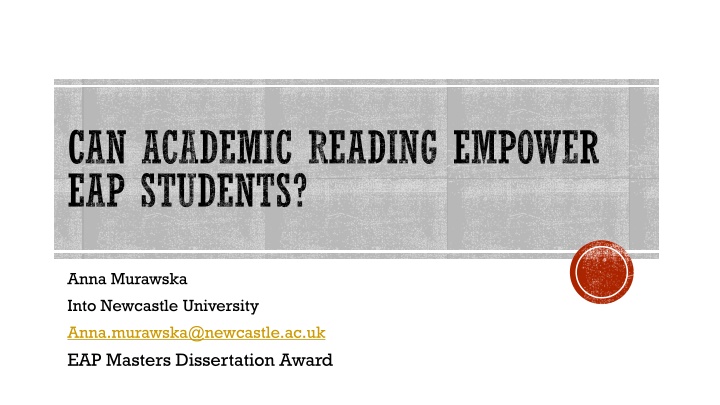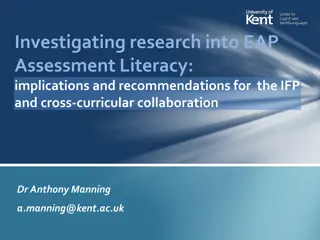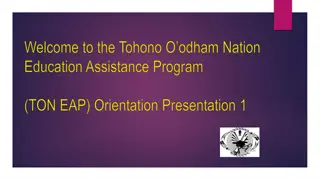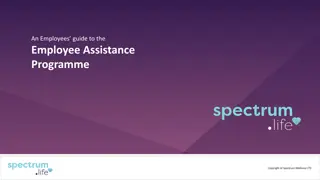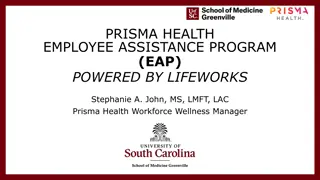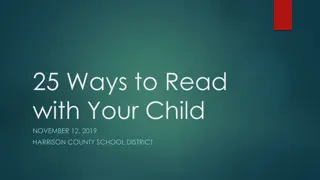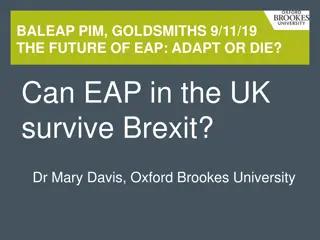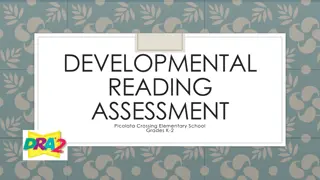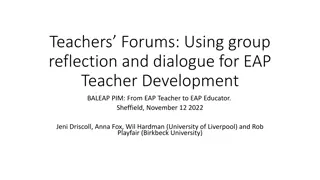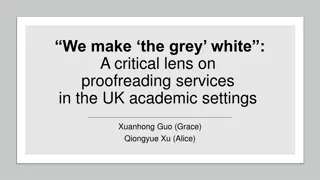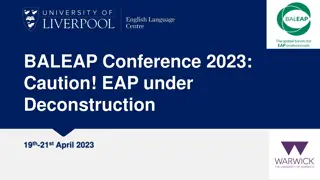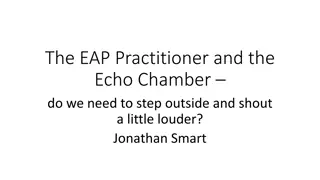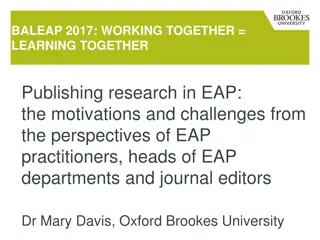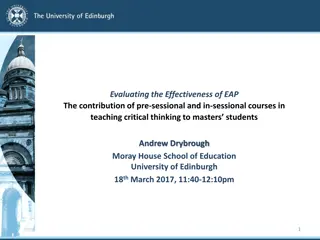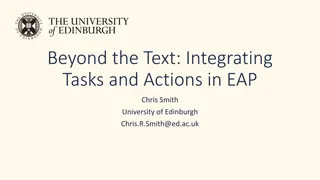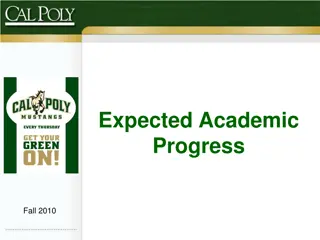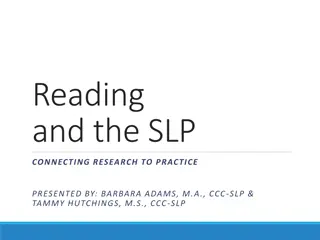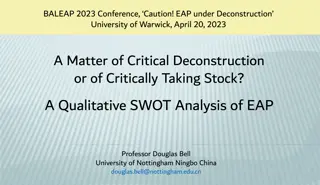Empowering EAP Students Through Academic Reading
This research delves into the impact of academic reading on Empowering English for Academic Purposes (EAP) students. It explores barriers to empowerment, EAP teaching methods, research implications, and diverse reading identities. The study aims to uncover how academic reading can enhance the learning experience and empower students in higher education.
Download Presentation

Please find below an Image/Link to download the presentation.
The content on the website is provided AS IS for your information and personal use only. It may not be sold, licensed, or shared on other websites without obtaining consent from the author.If you encounter any issues during the download, it is possible that the publisher has removed the file from their server.
You are allowed to download the files provided on this website for personal or commercial use, subject to the condition that they are used lawfully. All files are the property of their respective owners.
The content on the website is provided AS IS for your information and personal use only. It may not be sold, licensed, or shared on other websites without obtaining consent from the author.
E N D
Presentation Transcript
CAN ACADEMIC READING EMPOWER EAP STUDENTS? Anna Murawska Into Newcastle University Anna.murawska@newcastle.ac.uk EAP Masters Dissertation Award
OUTLINE Rationale & definitions Barriers to empowerment: L2 readers in HE Does EAP teach reading in an empowering way? Research Implications Discussion & questions
RATIONALE & DEFINITIONS Rationale: personal & professional Empower: access, equality, voice, confidence, resistance
BARRIERS TO EMPOWERMENT - L2 READERS IN POSTGRADUATE STUDY 1. Misunderstanding of what the purpose of academic reading on PG level is Disempowering:text as an objective carrier of correct knowledge (Erdreich and Rapoport (2002),Gamache (2002) 2. Students previous experience of reading in English Disempowering: text as a linguistic object (Maclellan, 1997) 3. Reading naturalised as pre-writing Disempowering:invisible / assessed (Mann, 2000) OVERALL: reading = playing a game, which rules you don t know There is a need for explicit reading pedagogy
DOES EAP TEACH READING IN AN EMPOWERING WAY? 3 broad approaches to academic literacy different empowering potential (table 2) Traditionalist: skills oriented Social: text oriented Critical: practices oriented No EAP reading research in critical paradigm Research question: Can academic reading empower EAP students?
RESEARCH Context: 8-months pre-masters programme, 85% Chinese students Entry requirements: IELTS: 5.5 18 participants: 3 x group interview and 6 individual interviews Qualitative research paradigm: Narrative Inquiry Data analysis and presentation: 1 reading story Focal participant: Bea Story title: Reading in a second language is like doing ..but it can help me break ..
READING IN A SECOND LANGUAGE IS LIKE DOING MATHEMATICS BUT IT CAN HELP ME BREAK THE WALL IN MY BRAIN
CAN ACADEMIC READING EMPOWER EAP STUDENTS? 3 reading identities A reader of English A reader of Western Worlds A reader of Academia
IDENTITY 1. A READER OF ENGLISH DISEMPOWERING Frustration and if you check all the new vocabulary you forget what the previous part said Prisoner of text when I get the task, I read a lot, many times , all my day on reading , the day is gone Physical effort / discomfort my brain, eyes and body struggle Powerlessness sometimes it s not clear what the author means , I don t know why, I thought I d understood Technical skill I have to find a subject, verb. It is like doing mathematics EMPOWERING Resistance it s just language, it won t stop me from learning things Independence with writing nobody can help [ ] by reading again and again you can check yourself
IDENTITY 2. A READER OF WESTERN WORLDS DISEMPOWERING Meaningless: if the topic is totally new, maybe it doesn t speak to me Irrelevant: British articles are often not applicable to my context Unable to exploit inner capital: I sometimes read in Chinese but there s a drawback. When I use <English> key words from these articles I only get Chinese researchers, not the foreigners. Agentless: And sometimes when I have my own idea and want to find evidence, this evidence is only in Chinese so If I want <my teachers> to think it s rational and makes sense I need to change my logic . EMPOWERING? Resistance: <With topics such as> freedom or else, <there s> different understanding and values. I found some articles online, in which they will think it s correct and totally right and want to communicate to other westerners and just enjoy their world (soft laugh).
IDENTITY 3. A READER OF ACADEMIA DISEMPOWERING Anxiety if there s a strong argument against my own I ll be worried EMPOWERING Active reading if I read actively by offering my idea and questions then I can get more Drawing on experience With Culture Shock essay, because you might think what the author says is wrong or not perfect and you have a lot of your own ideas against it, it will help you find other sources Transformative ( disruption of knowledge ) interesting content breaks the wall in my brain
CAN ACADEMIC READING EMPOWER EAP STUDENTS? Complex phenomenon Academic reading can be empowering, but for the most part it was not Empowering practices by-product of students learning rather than teaching / curriculum design THEREFORE There is a need for a systematic reading curriculum Although traditionalist & social approaches facilitate empowering reading experiences to some extent, there is more empowering potential yet to unlock in critical paradigm
IMPLICATIONS: EAP & BEYOND 1. EAP curriculum Culturally inclusive course readings and assignment topics Comprehension as well as reactions to text Allowing texts in L1 Using online non-academic sources (e.g. academic blogs) More reflective approach to reading & learning Alternative assessment 2. Classroom practice Text as a usable resource and not a lingustic object oDisassembling texts (Gimenez and Thomas, 2015) Reading as a group activity 3. Wider context Subject teachers role
IMPLICATIONS: CLASSROOM PRACTICE Text as a usable resource and not a lingustic object o objectifying text
ON MY PROGRAMME Explicit reading instruction Encourage annotations / marginalia (Asimakopoulos, 2015) Critical reading worksheets Reflective journals with structured questions Reflective essays
CONCLUSION EAP mission: access to ways of knowing (Hyland, 2018) It is our responsibility to make academic reading practices more visible
DISCUSSION AND QUESTIONS Please share examples of good practice / relevant research (Anna.murawska@newcastle.ac.uk) What can we do to go beyond study skills and genre approaches? (see: table 2)
REFERENCES Asimakopoulos (2015) Reading in Reading Erdreich, L., & Rapoport, T. (2002). Elaborating ethnonational awareness via academic literacy: Palestinian Israeli women at the university. Anthropology & education quarterly, 33(4), 492-515. Gamache, P. (2002). University students as creators of personal knowledge: An alternative epistemological view. Teaching in higher education, 7(3), 277-294. Gimenez, J. & Thomas, P. (2015). A framework for usable pedagogy: case studies towards accessibility, criticality and visibility. In: T. Lillis, K. Harrington, M. Lea & S. Mitchell, S. (Eds.). Working with academic literacies: Case studies towards transformative practice (p.29-44). The WAC Clearinghouse/Parlor Press. Hyland, K. (2018). Sympathy for the devil? A defence of EAP. Language Teaching, 51(3), 383-399. doi:10.1017/S0261444818000101 Mann, S. J. (2000). The students' experience of reading. Higher Education, 39(3), 297-317. Maclellan, E . (1997) Reading to Learn , Studies in Higher Education 22: 277 88.
